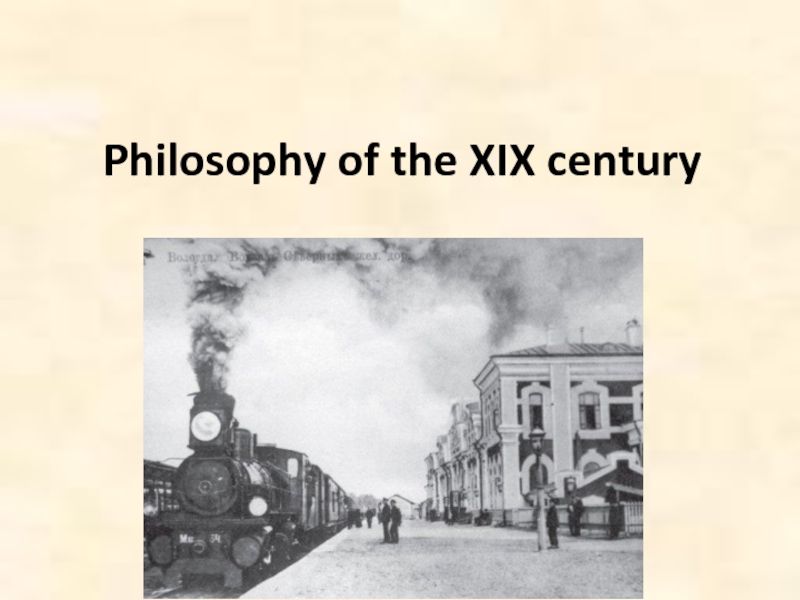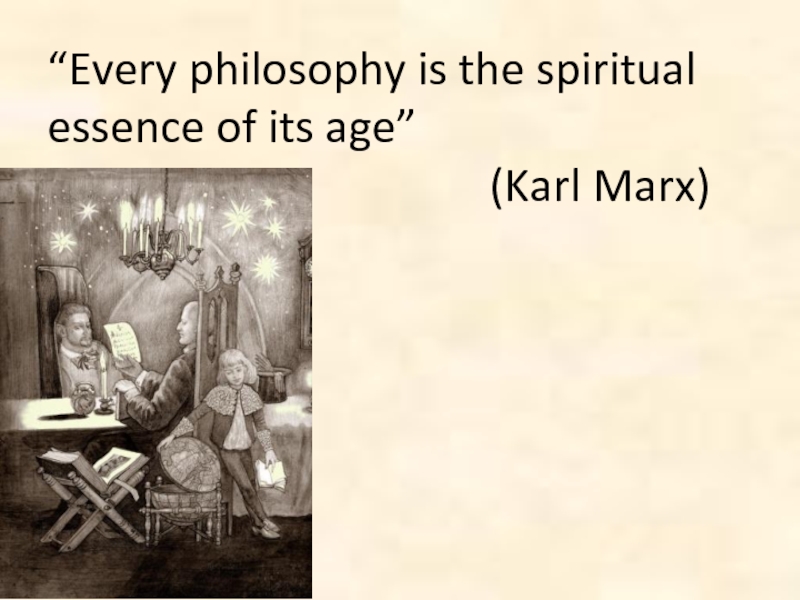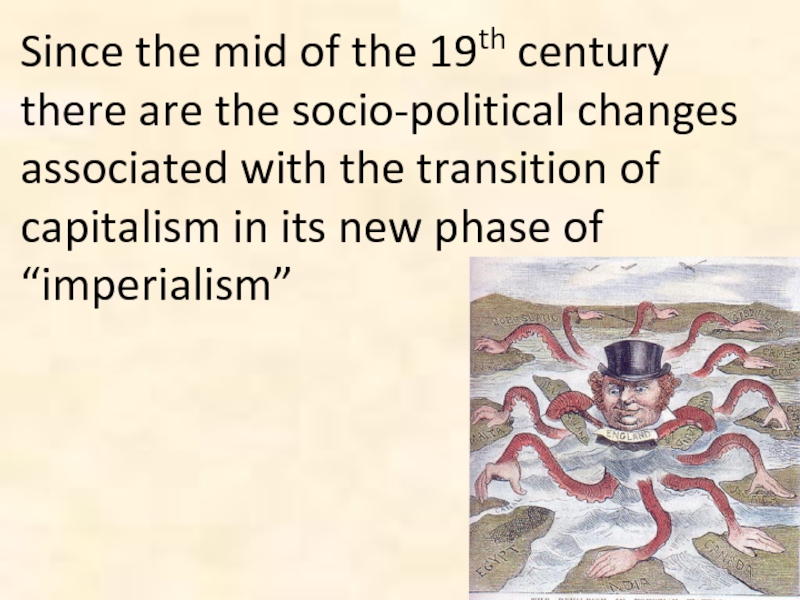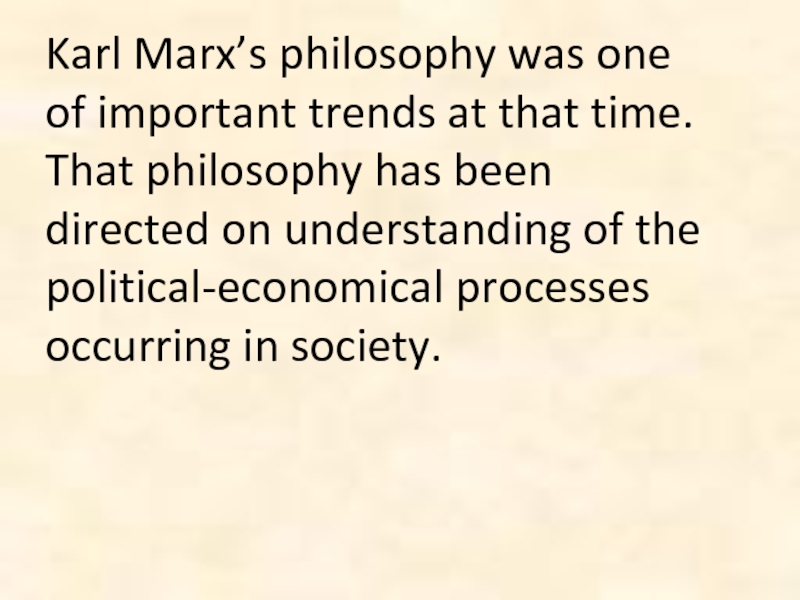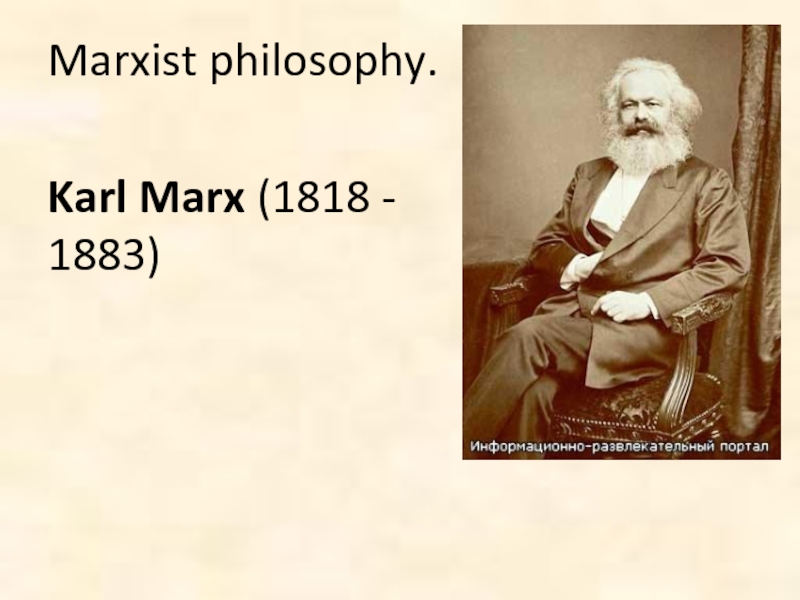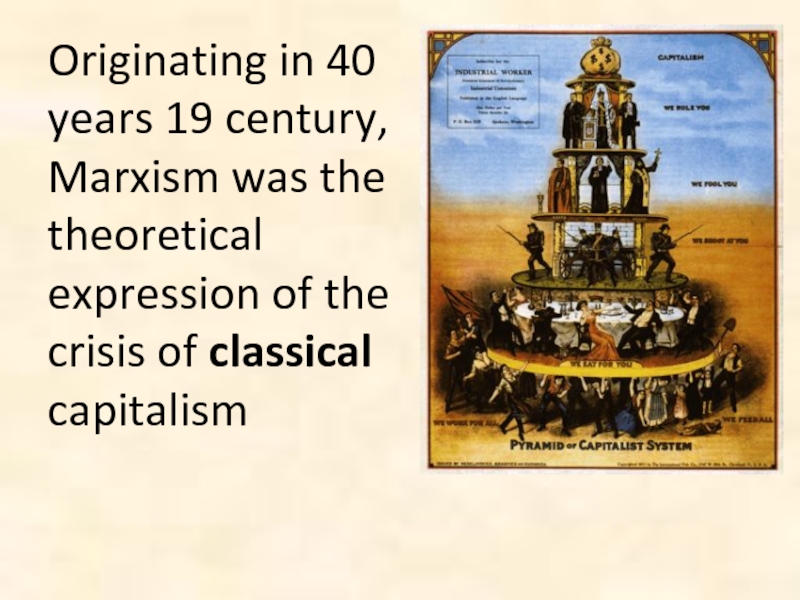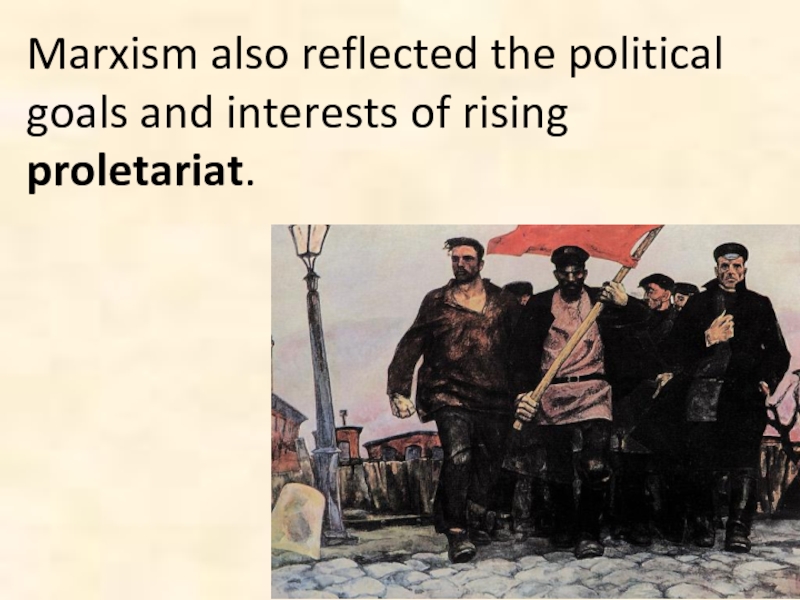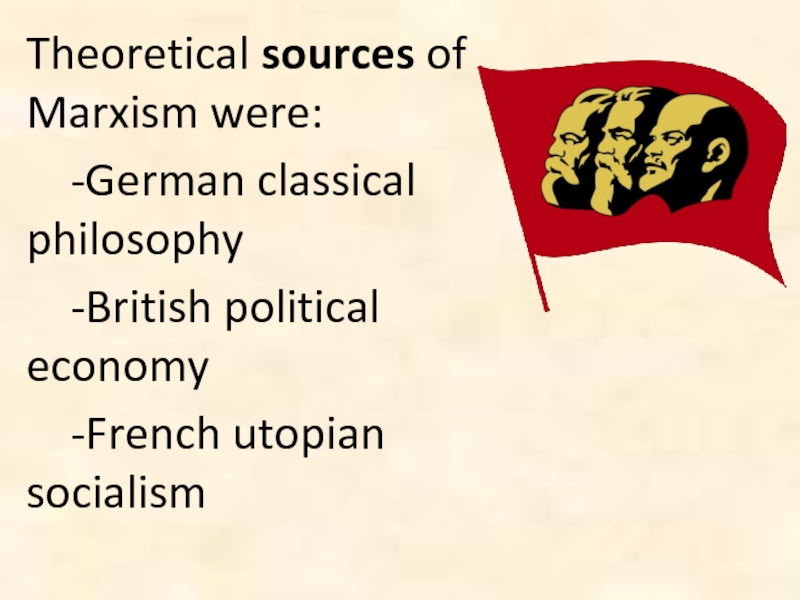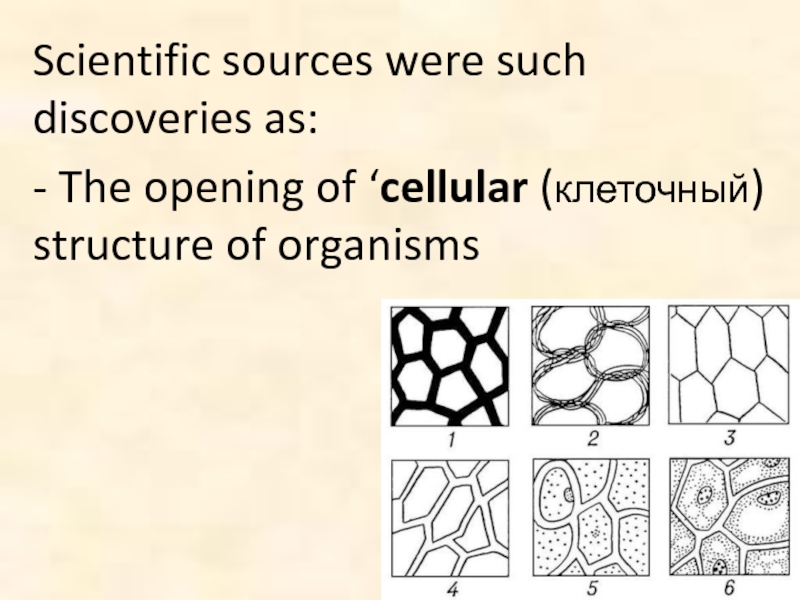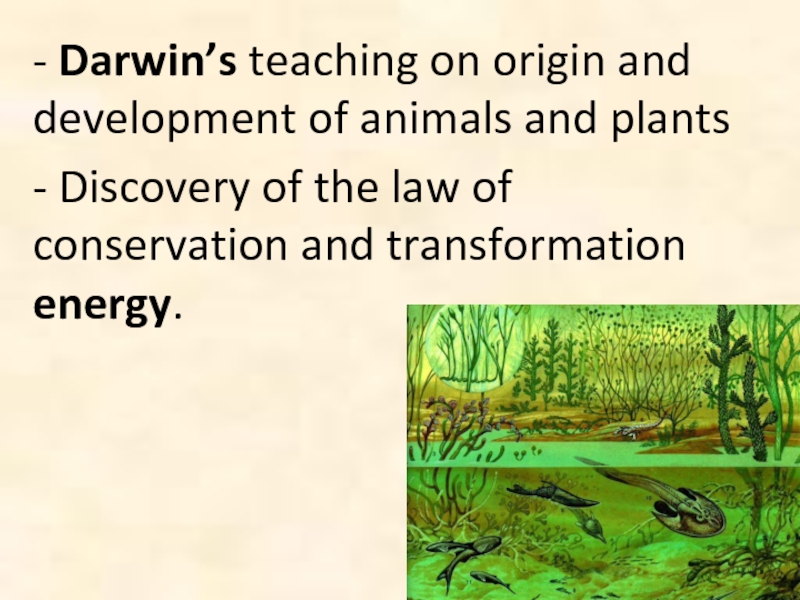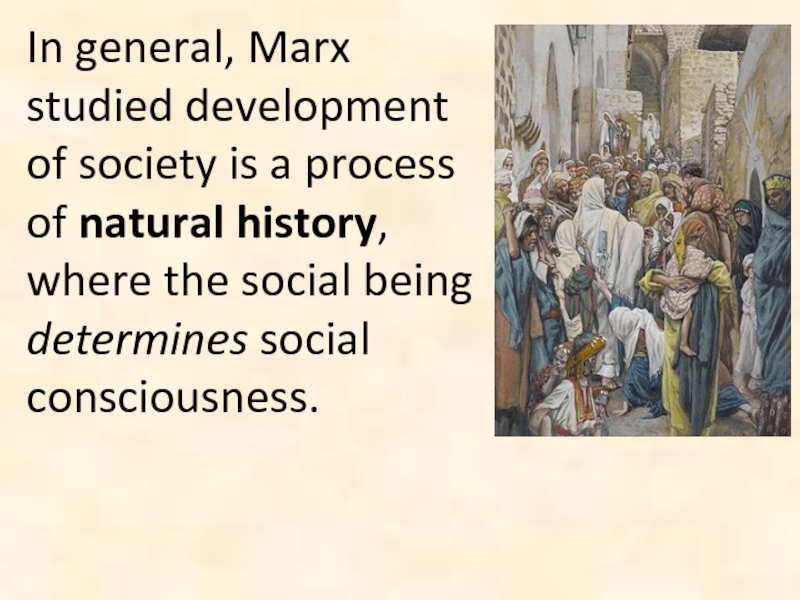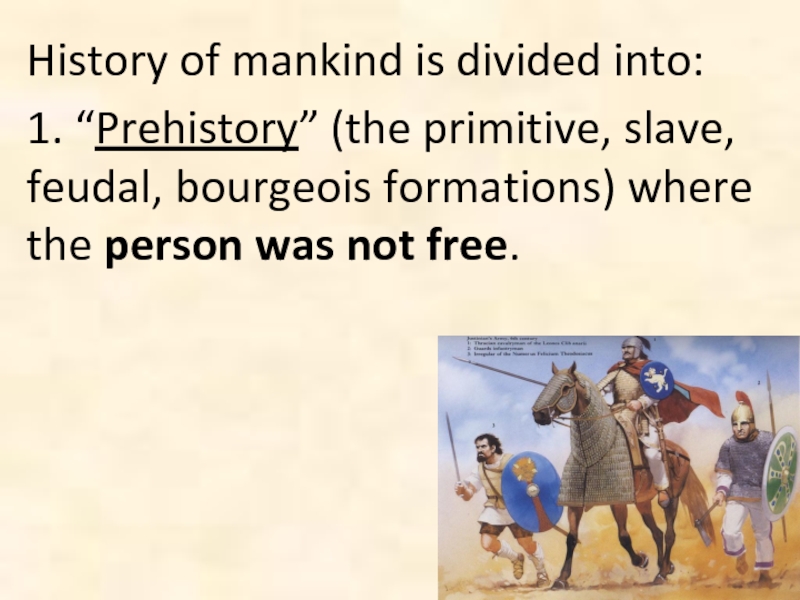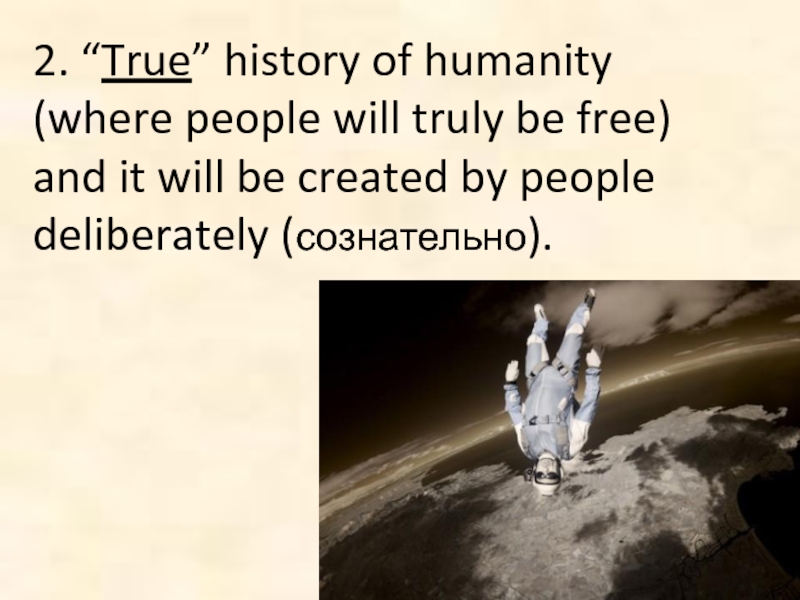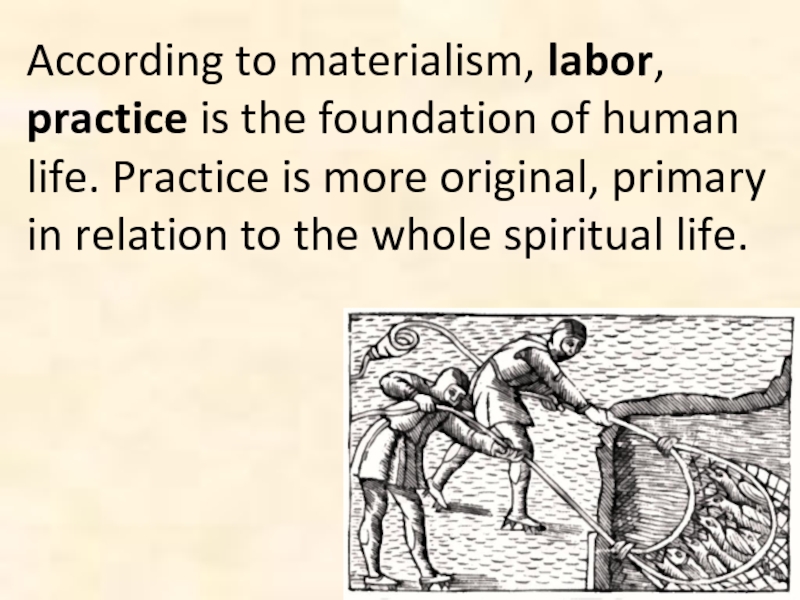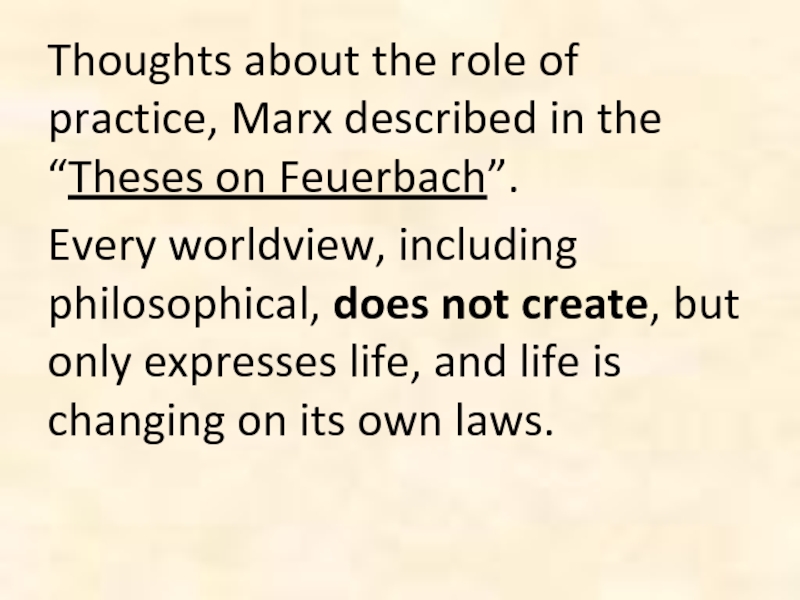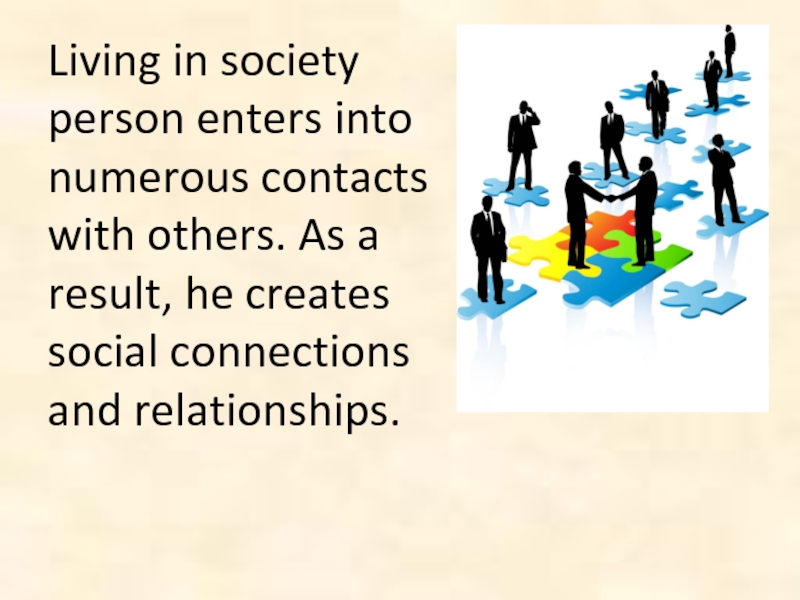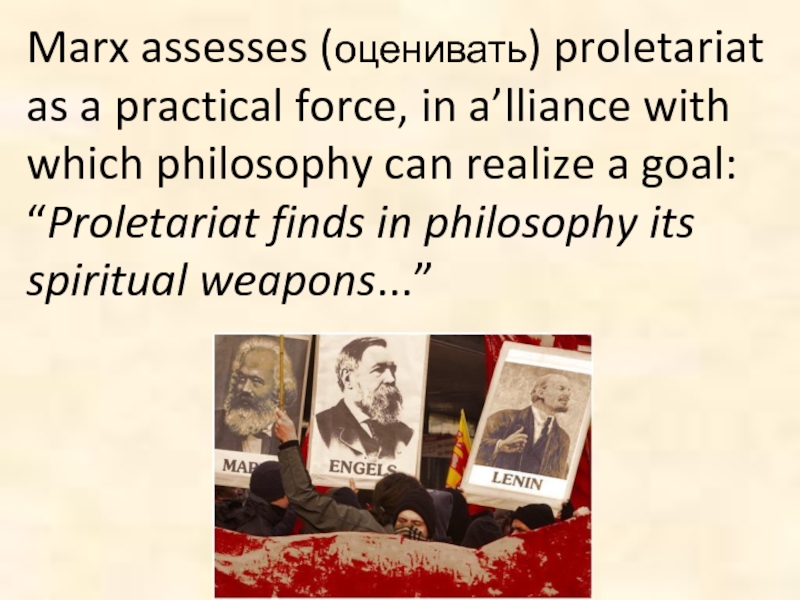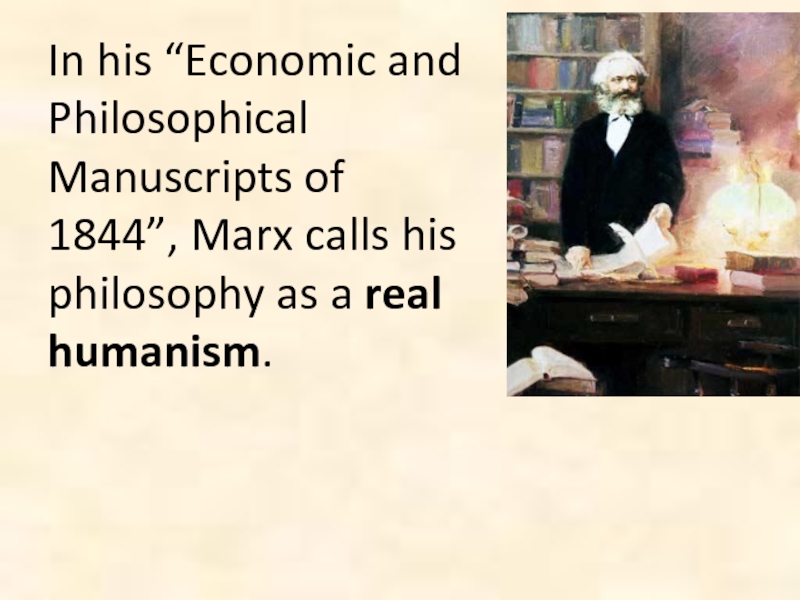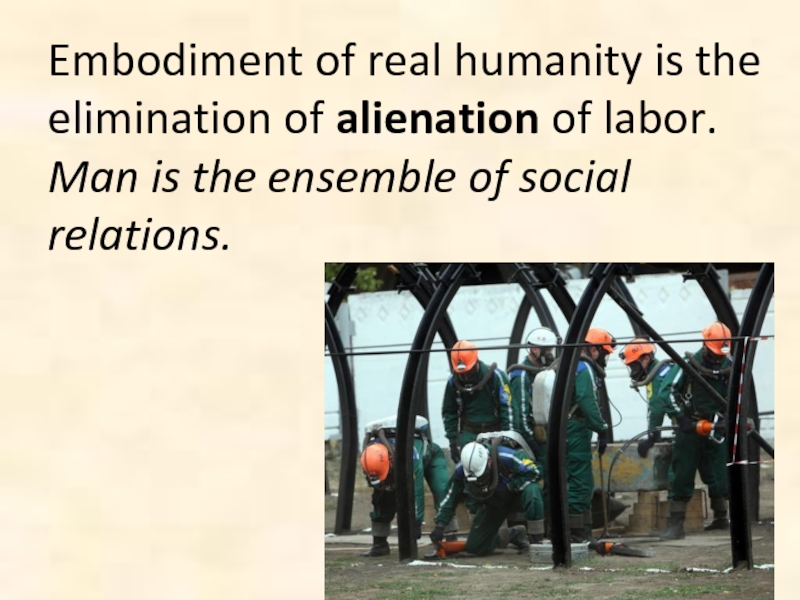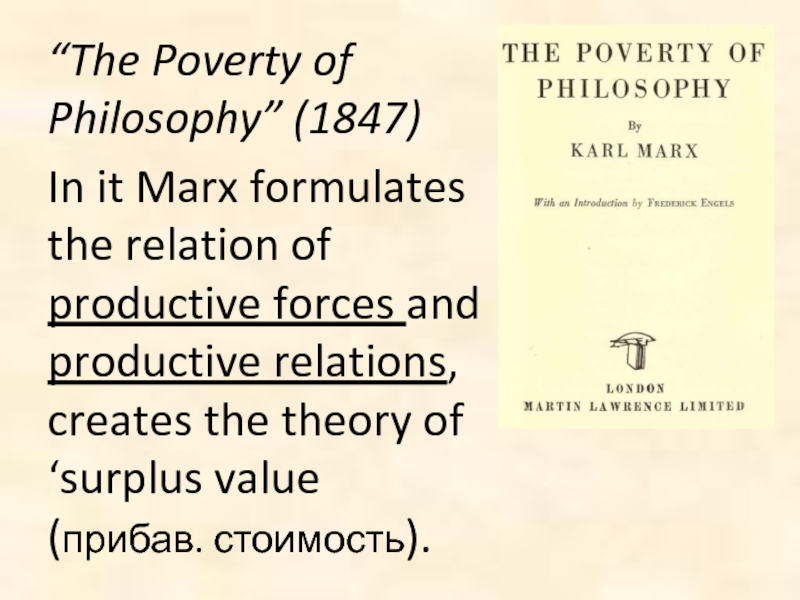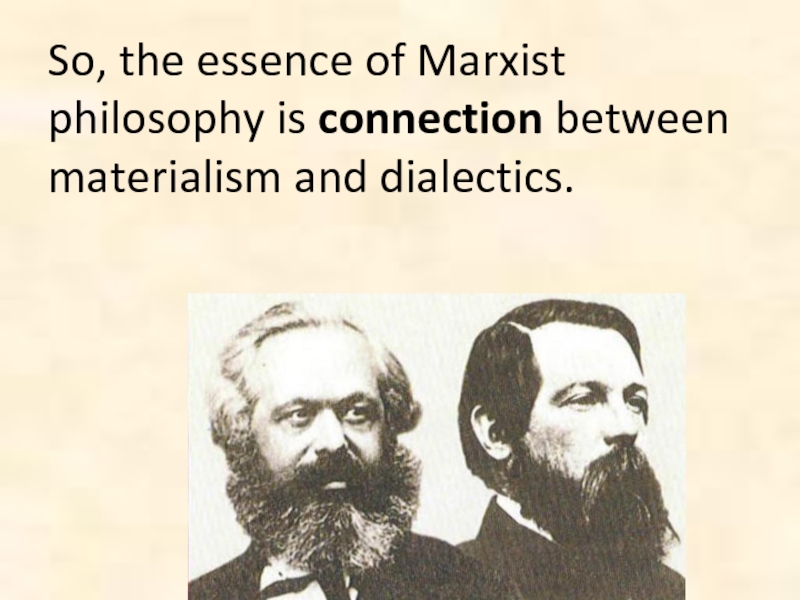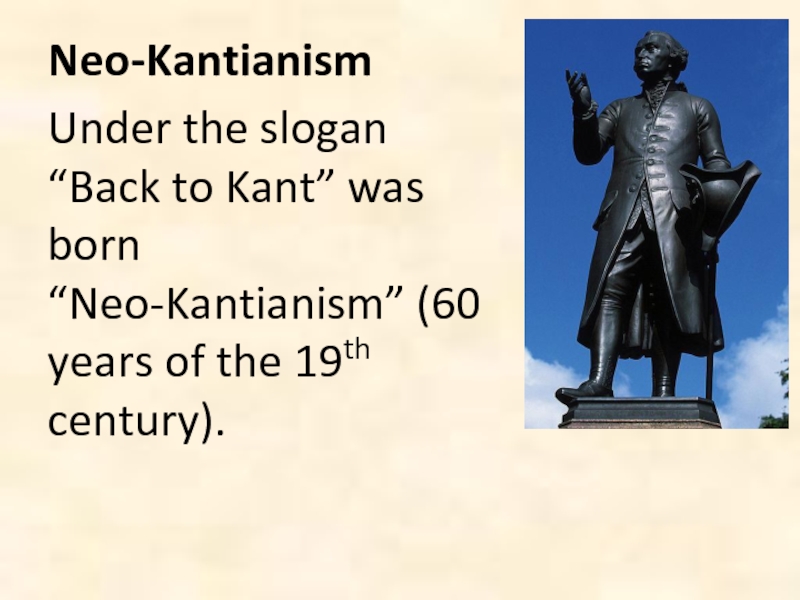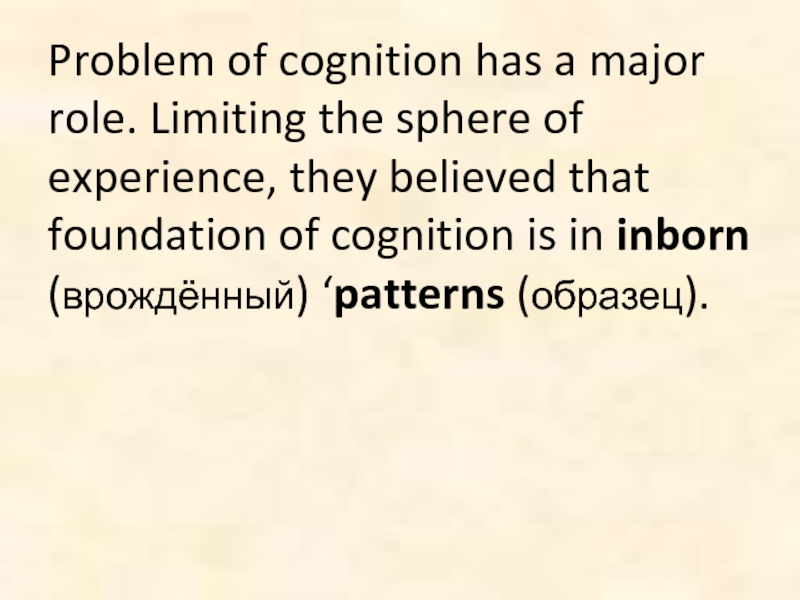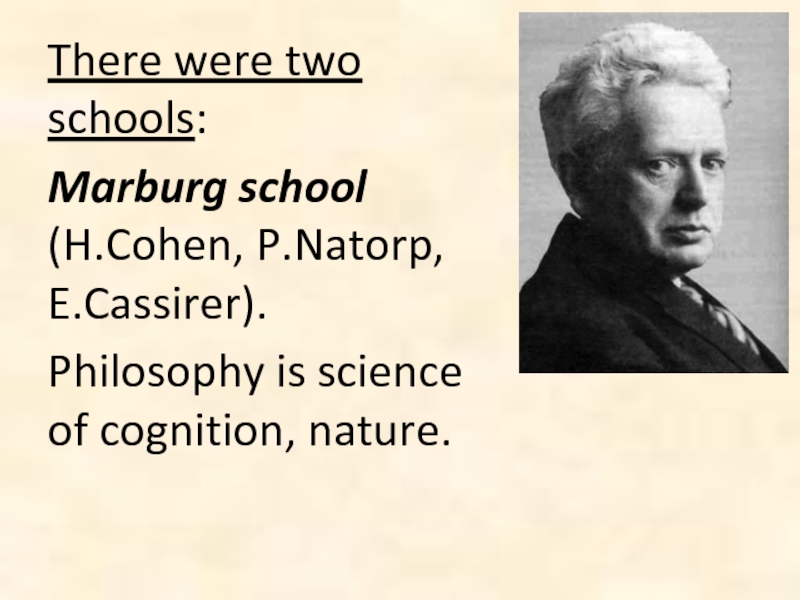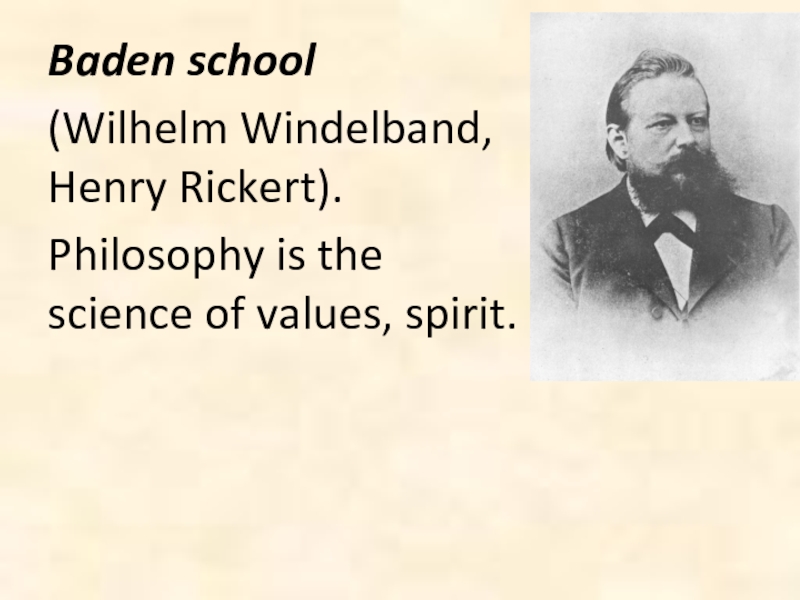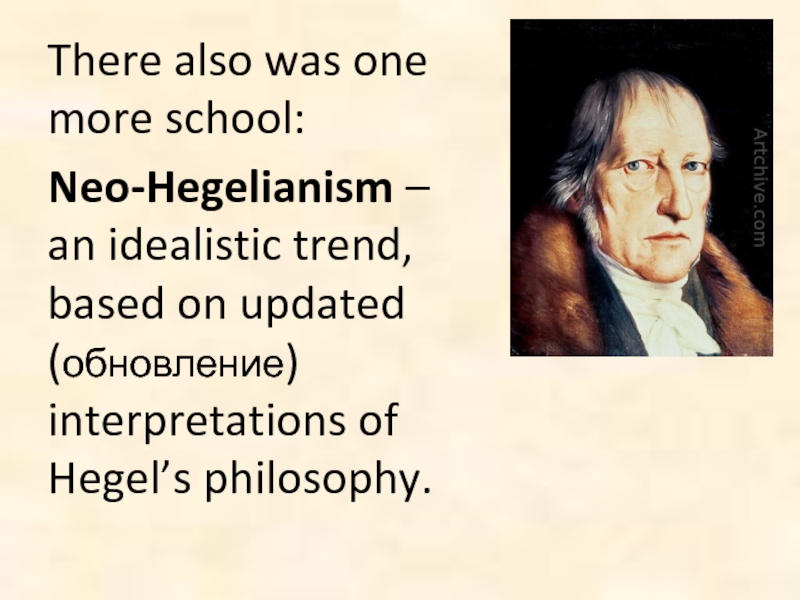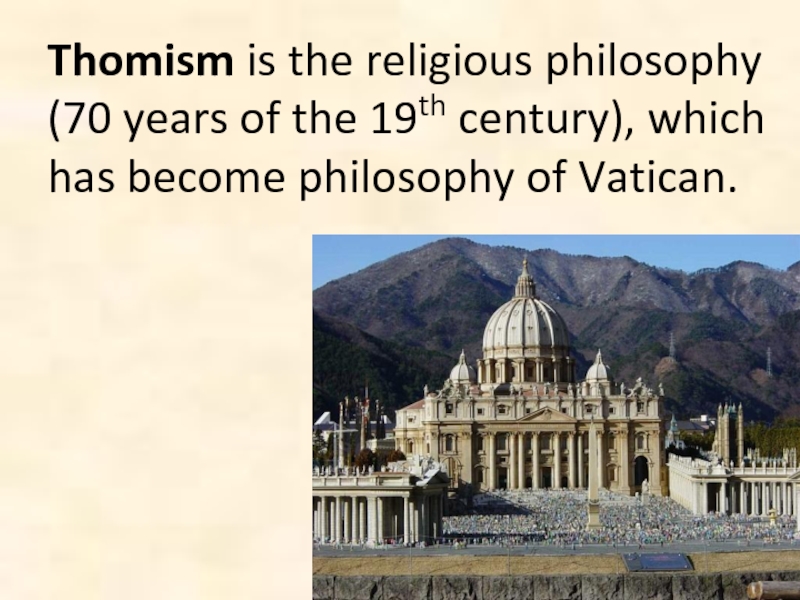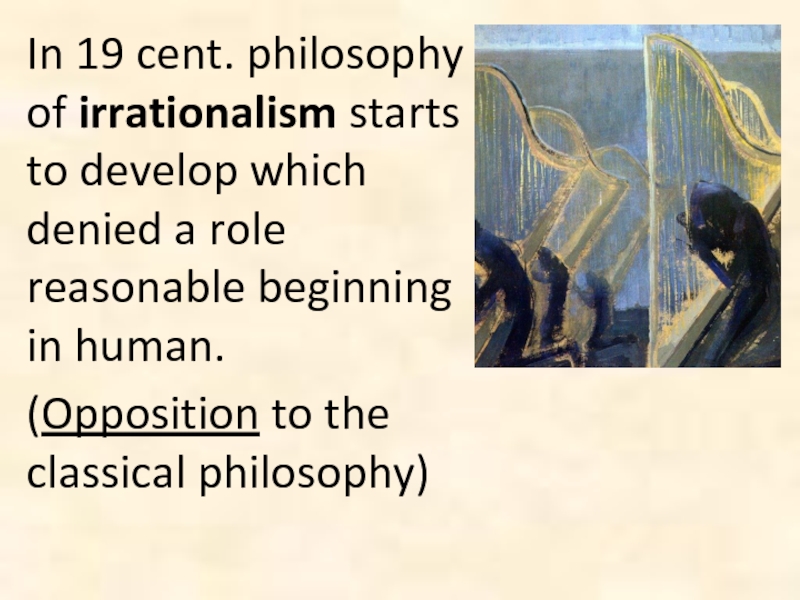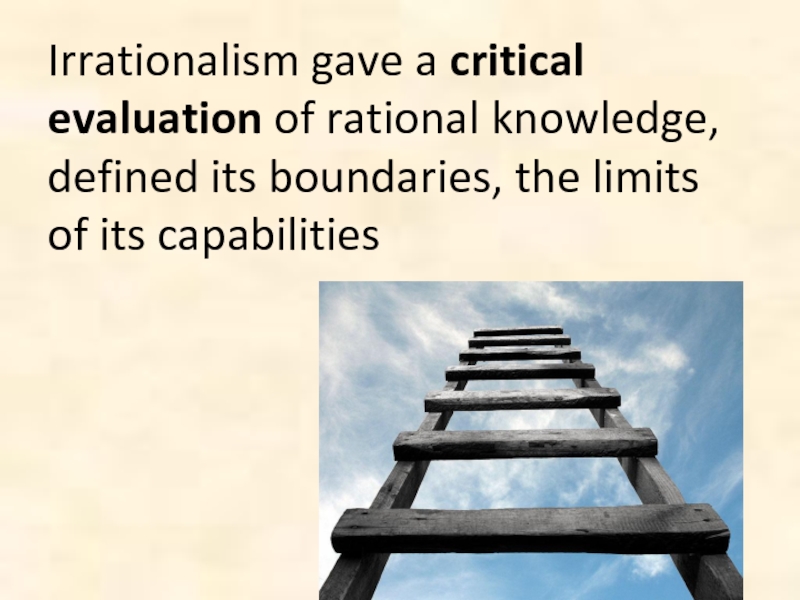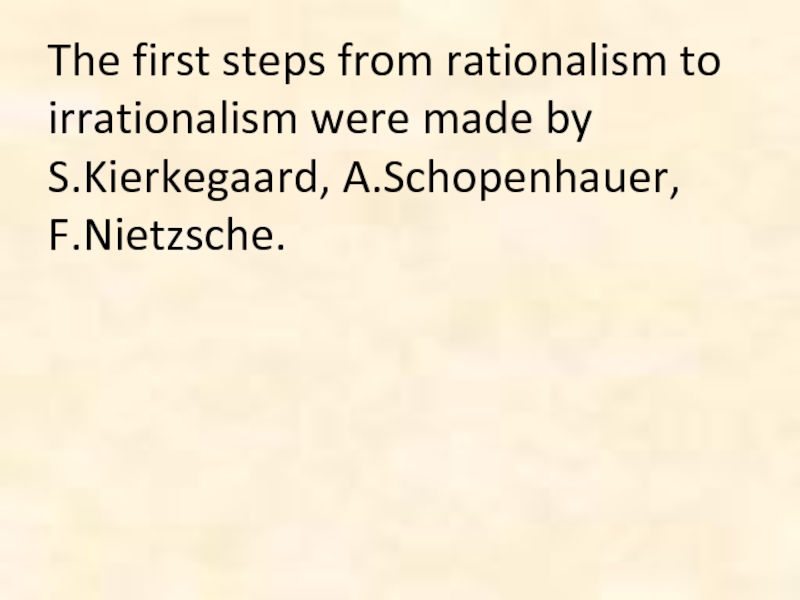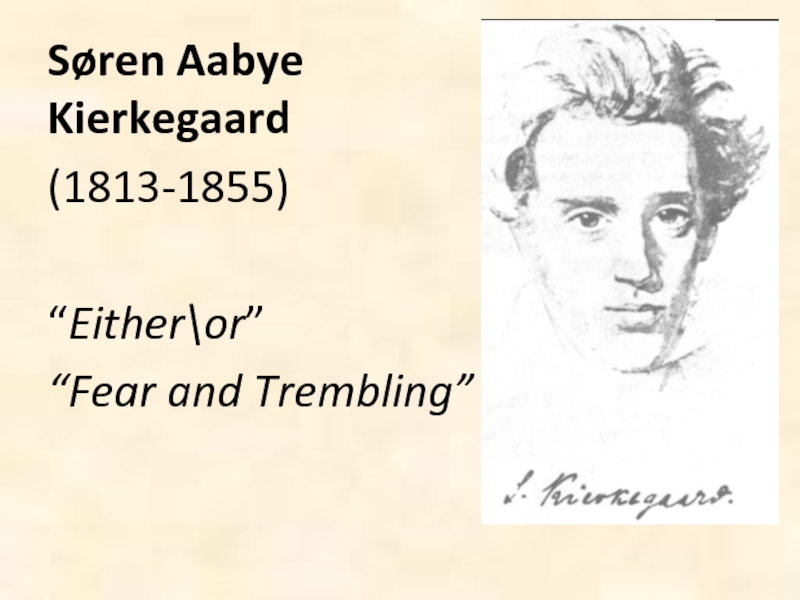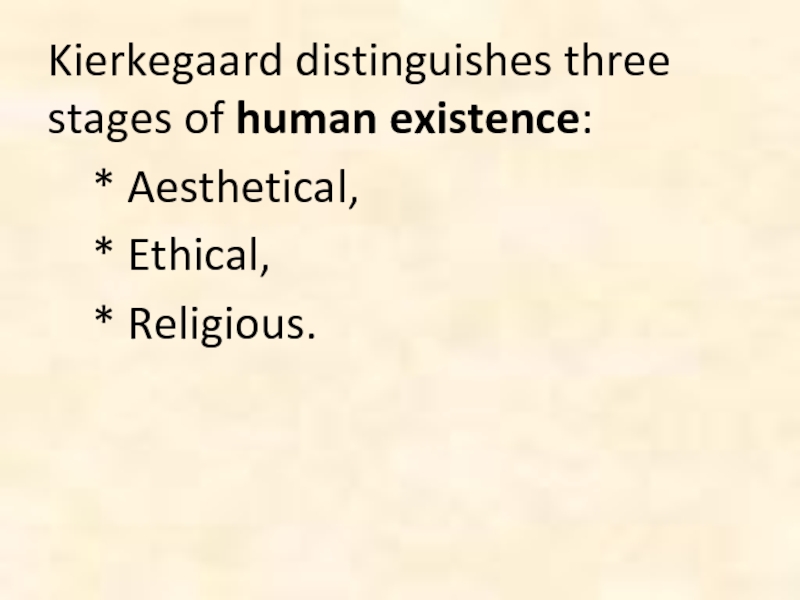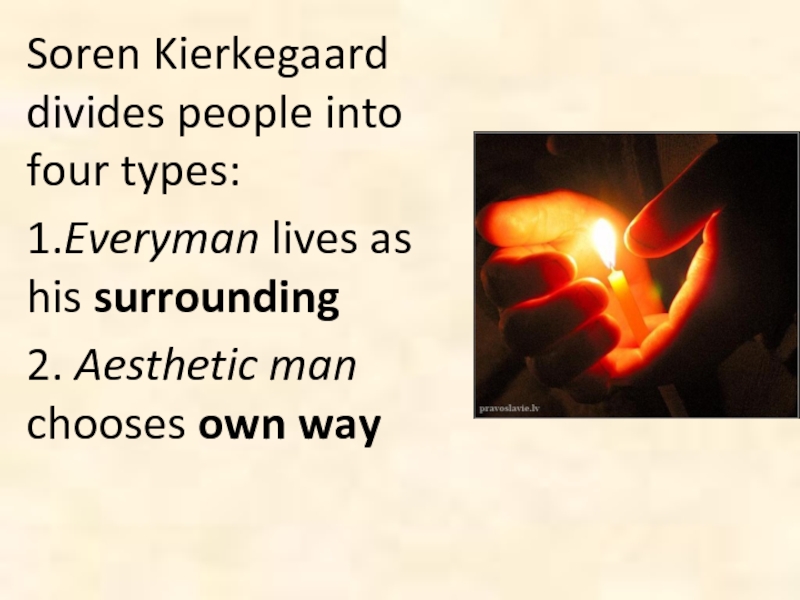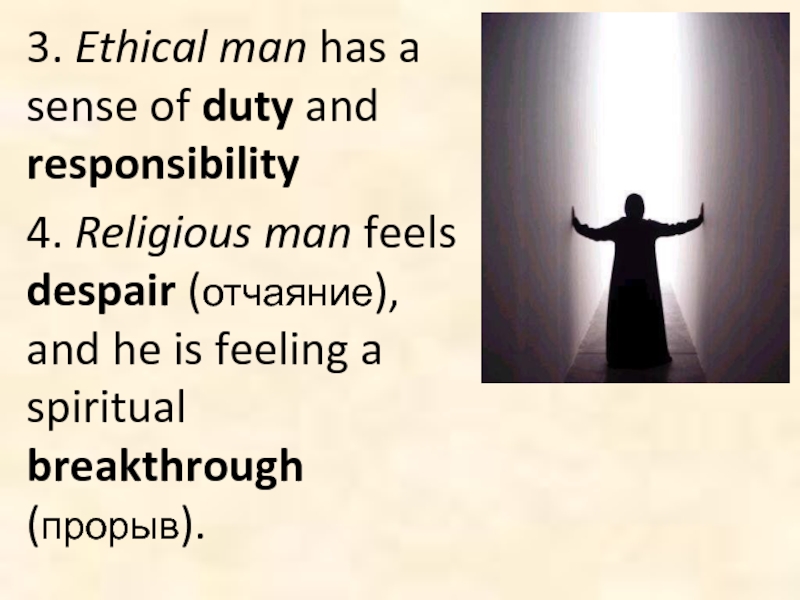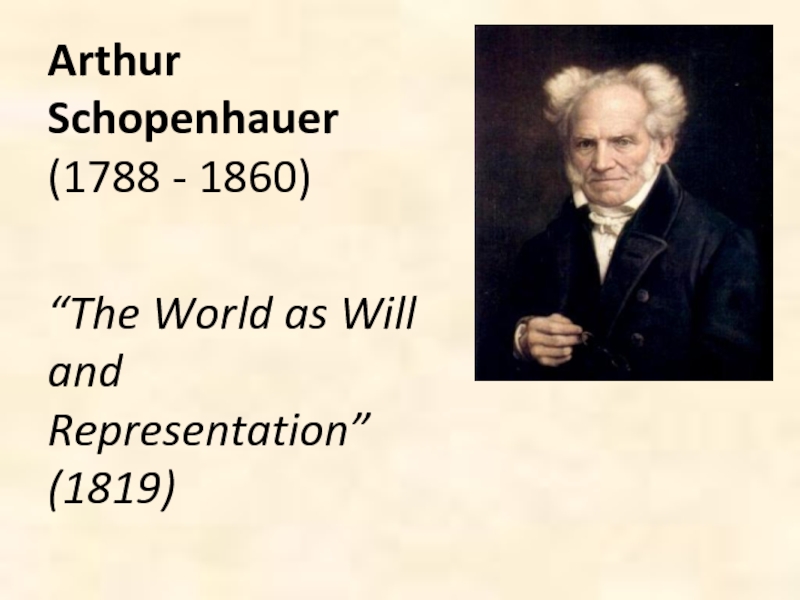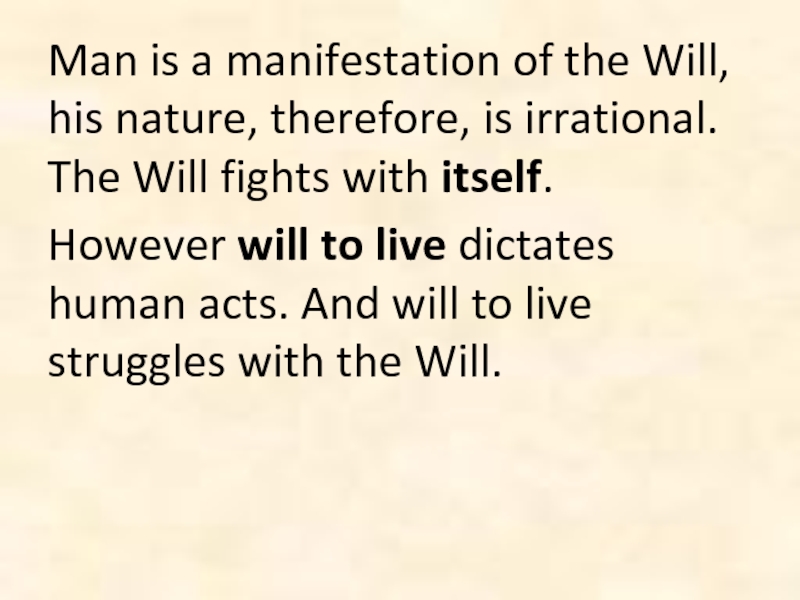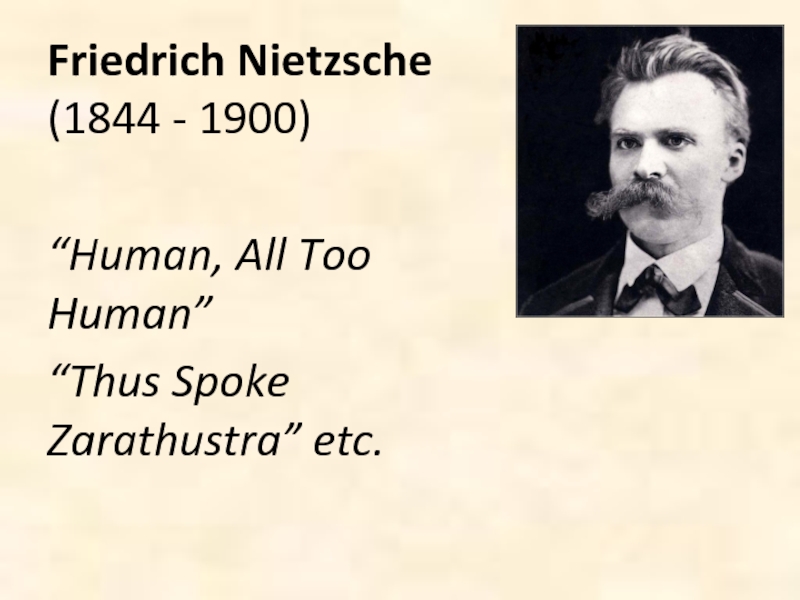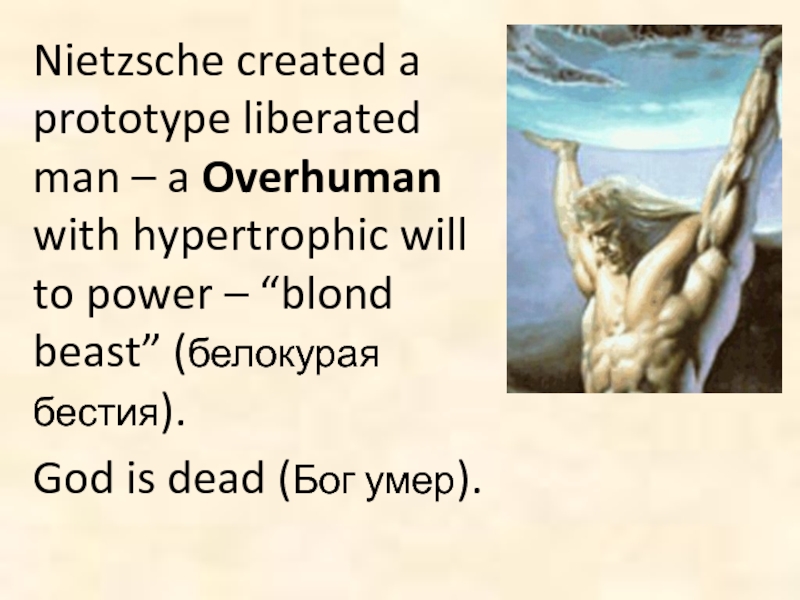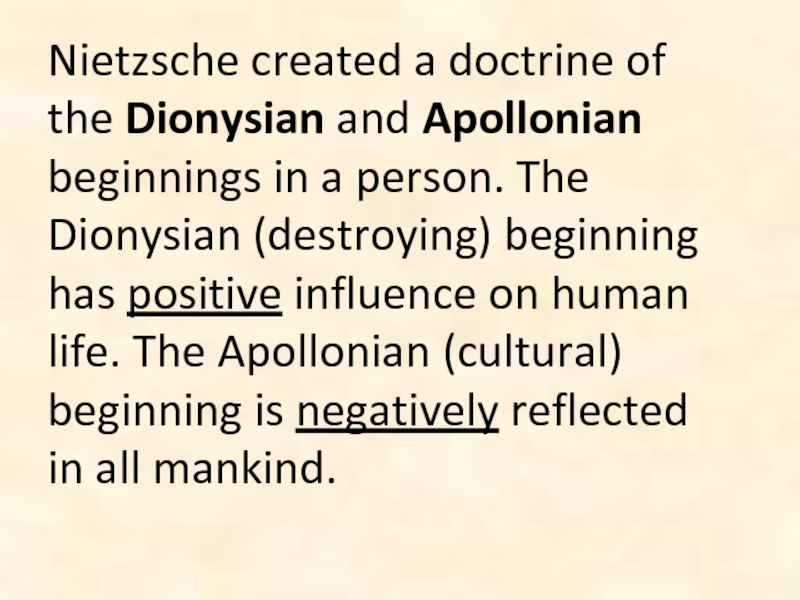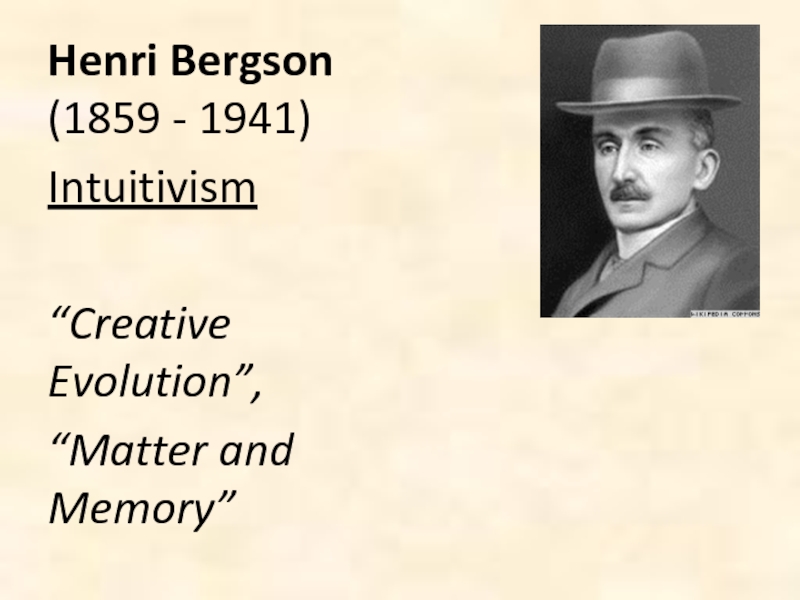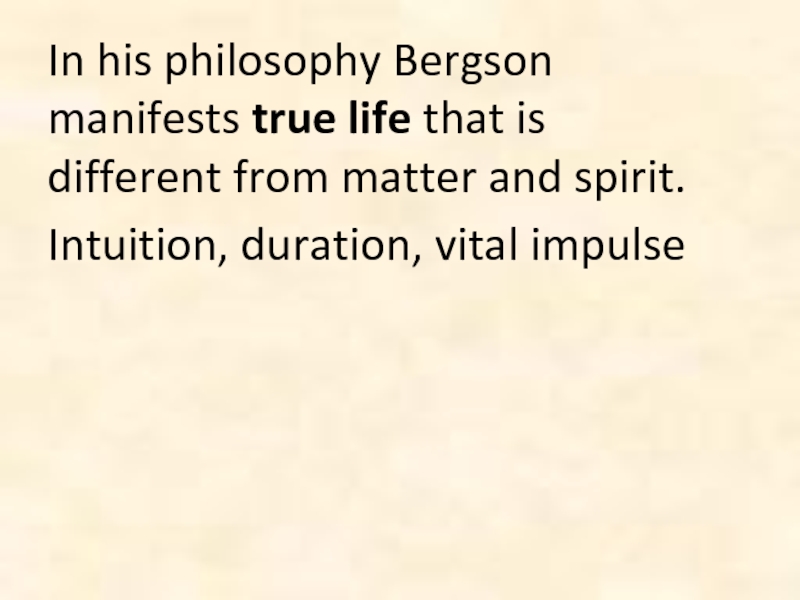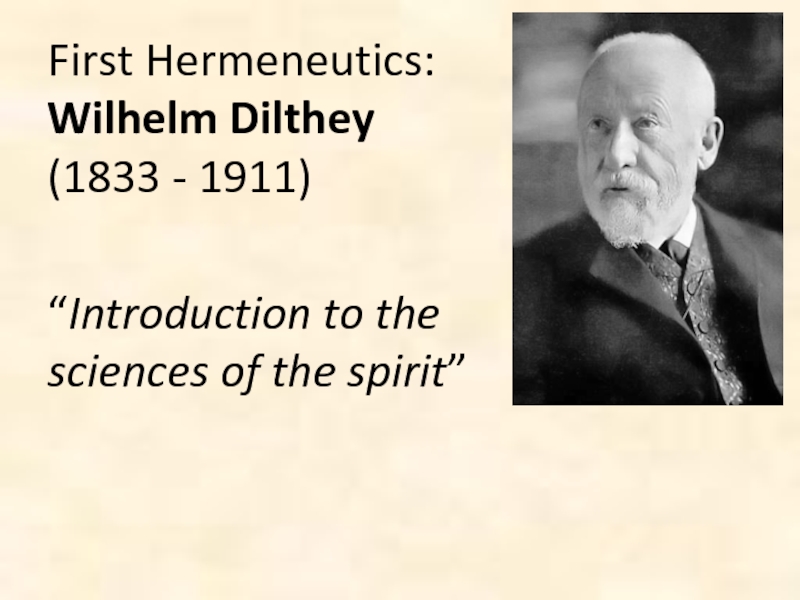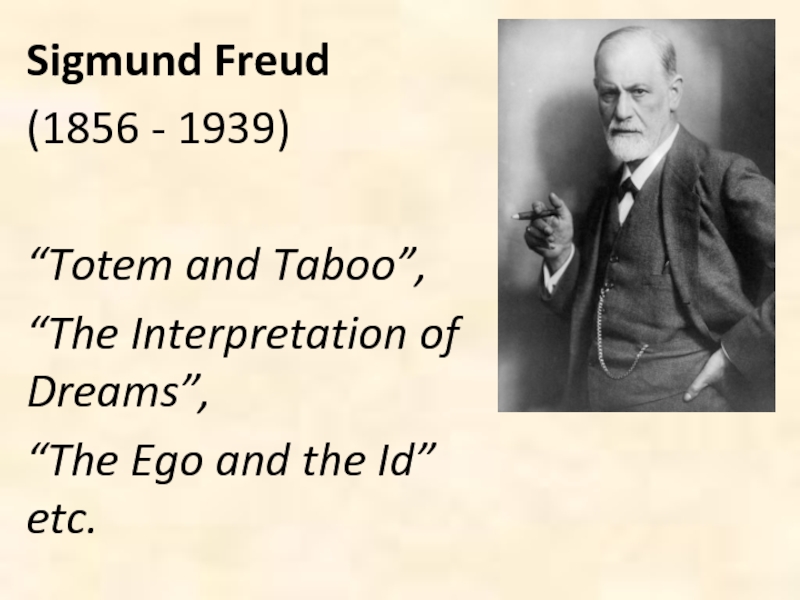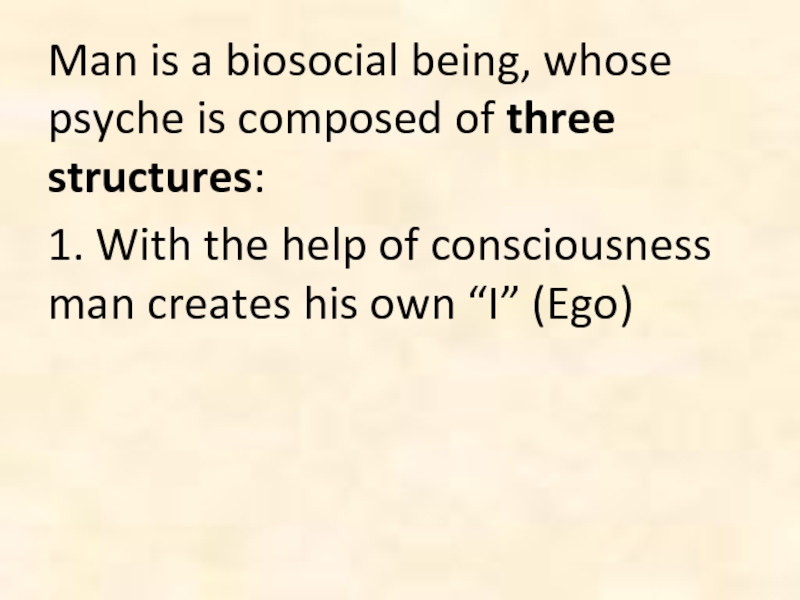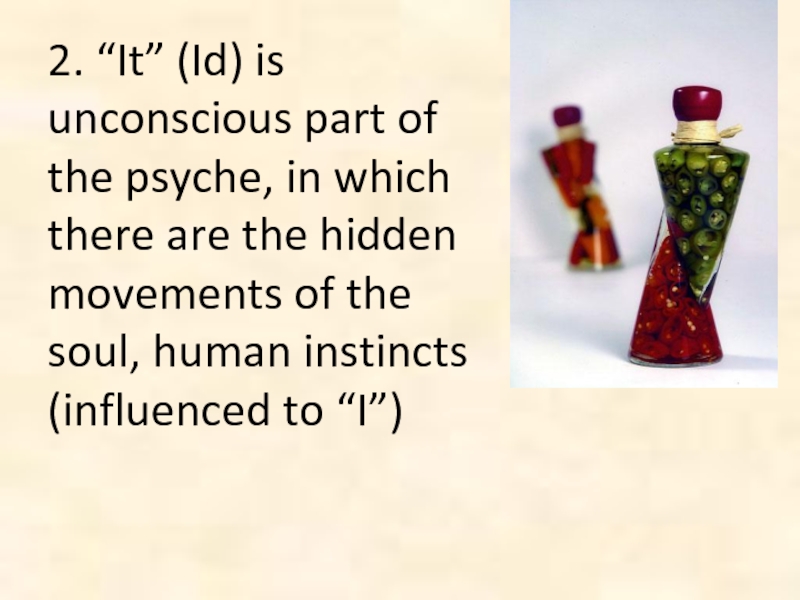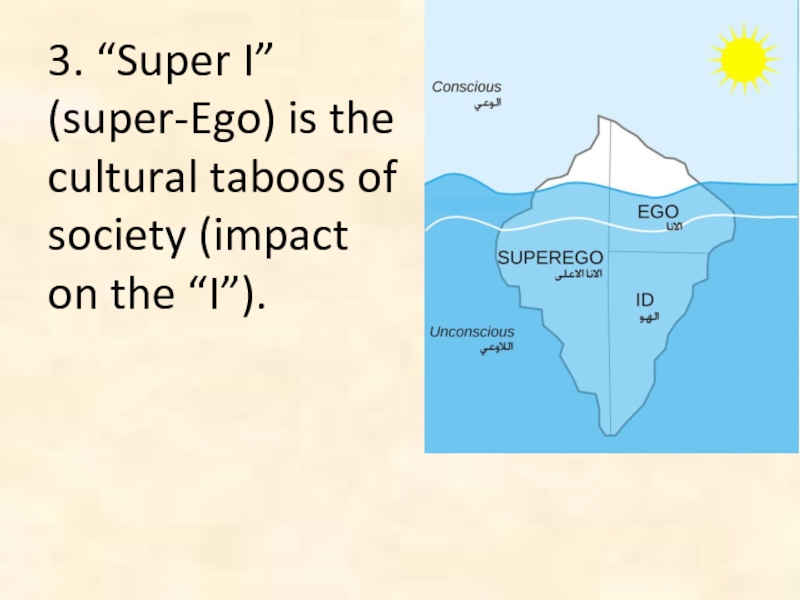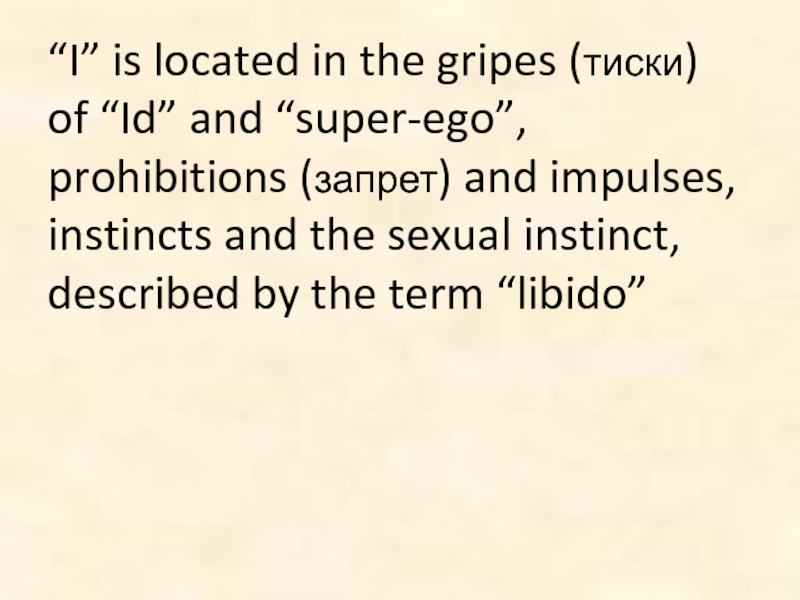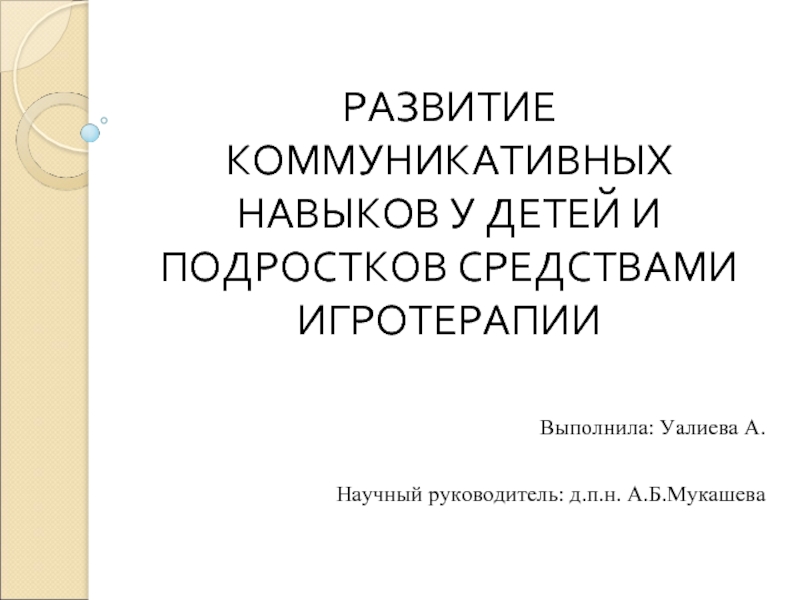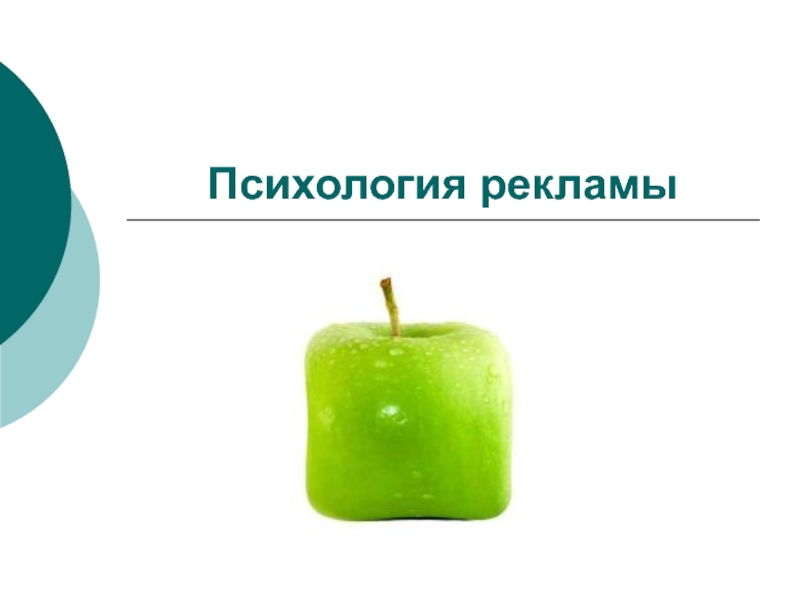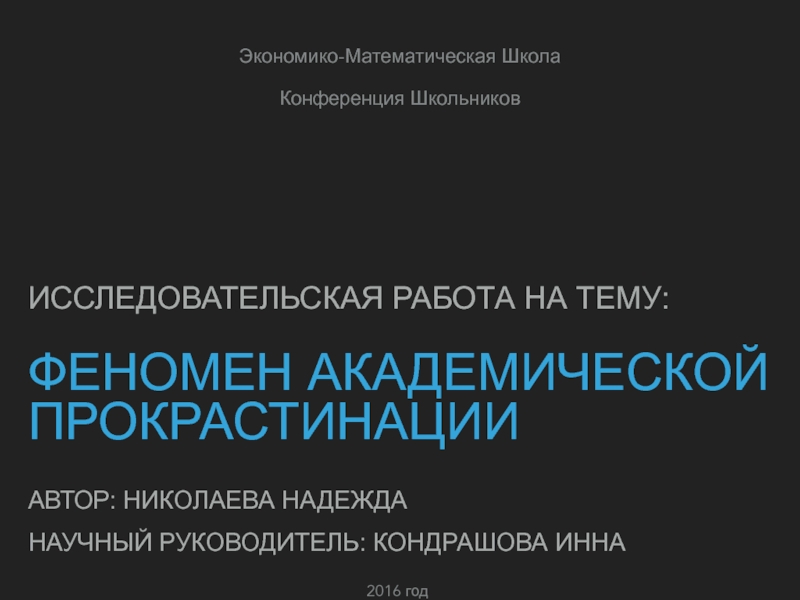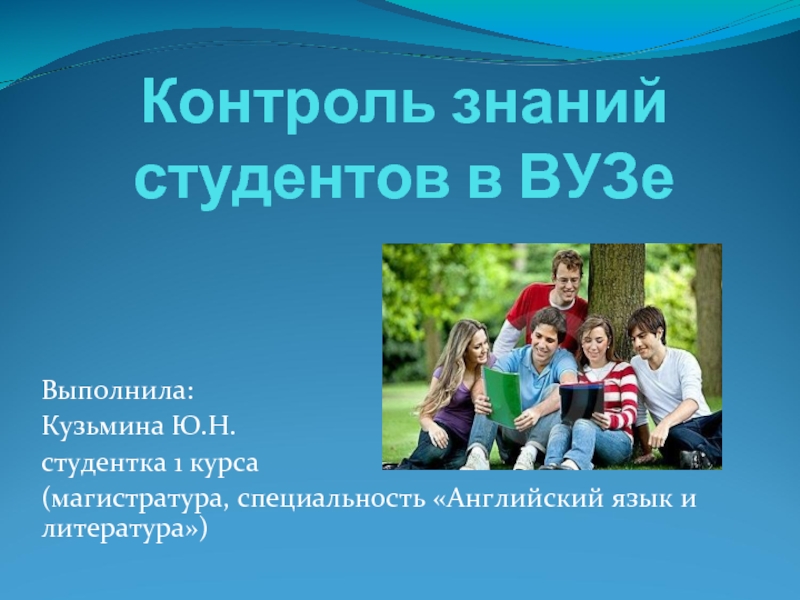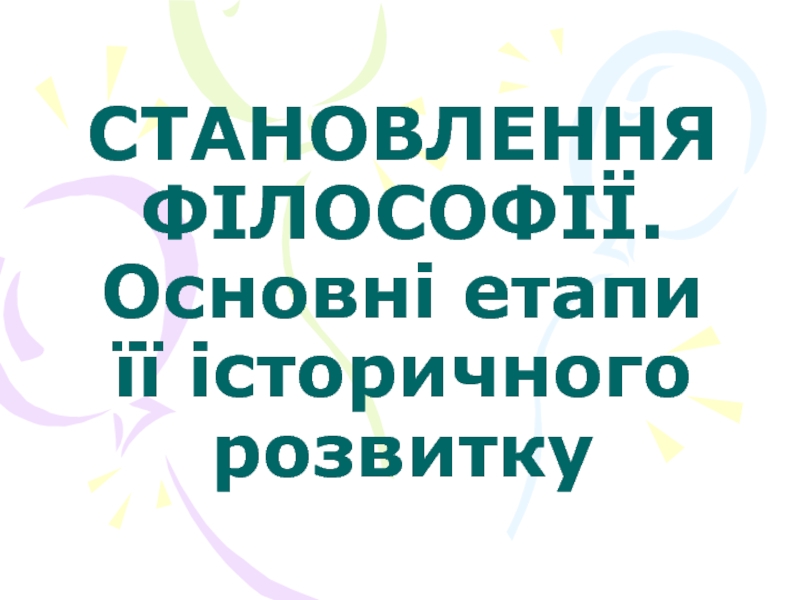- Главная
- Разное
- Дизайн
- Бизнес и предпринимательство
- Аналитика
- Образование
- Развлечения
- Красота и здоровье
- Финансы
- Государство
- Путешествия
- Спорт
- Недвижимость
- Армия
- Графика
- Культурология
- Еда и кулинария
- Лингвистика
- Английский язык
- Астрономия
- Алгебра
- Биология
- География
- Детские презентации
- Информатика
- История
- Литература
- Маркетинг
- Математика
- Медицина
- Менеджмент
- Музыка
- МХК
- Немецкий язык
- ОБЖ
- Обществознание
- Окружающий мир
- Педагогика
- Русский язык
- Технология
- Физика
- Философия
- Химия
- Шаблоны, картинки для презентаций
- Экология
- Экономика
- Юриспруденция
Philosophy of the XIX century презентация
Содержание
- 1. Philosophy of the XIX century
- 2. “Every philosophy is the spiritual essence of
- 3. Since the mid of the 19th century
- 4. Karl Marx’s philosophy was one of important
- 5. Marxist philosophy. Karl Marx (1818 - 1883)
- 6. Marxist philosophy. Friedrich Engels (1820 - 1895)
- 7. Originating in 40 years 19 century, Marxism
- 8. Marxism also reflected the political goals and interests of rising proletariat.
- 9. Theoretical sources of Marxism were:
- 10. Scientific sources were such discoveries as: -
- 11. - Darwin’s teaching on origin and development
- 12. In general, Marx studied development of society
- 13. History of mankind is divided into: 1.
- 14. 2. “True” history of humanity (where people
- 15. According to materialism, labor, practice is the
- 16. Thoughts about the role of practice, Marx
- 17. Living in society person enters into numerous
- 18. In proletariat Marx and Engels saw a
- 19. Destruction of private property is the path to liberation.
- 20. Marx assesses (оценивать) proletariat as a practical
- 21. In his “Economic and Philosophical Manuscripts of
- 22. Embodiment of real humanity is the elimination
- 23. “The Poverty of Philosophy” (1847) In it
- 24. So, the essence of Marxist philosophy is connection between materialism and dialectics.
- 25. Neo-Kantianism Under the slogan “Back to Kant”
- 26. Problem of cognition has a major role.
- 27. There were two schools: Marburg school (H.Cohen, P.Natorp, E.Cassirer). Philosophy is science of cognition, nature.
- 28. Baden school (Wilhelm Windelband, Henry Rickert). Philosophy is the science of values, spirit.
- 29. There also was one more school:
- 30. Thomism is the religious philosophy (70 years
- 31. In 19 cent. philosophy of irrationalism starts
- 32. Irrationalism gave a critical evaluation of rational
- 33. The first steps from rationalism to irrationalism were made by S.Kierkegaard, A.Schopenhauer, F.Nietzsche.
- 34. Søren Aabye Kierkegaard (1813-1855) “Either\or” “Fear and Trembling”
- 35. Kierkegaard distinguishes three stages of human existence:
- 36. Soren Kierkegaard divides people into four types:
- 37. 3. Ethical man has a sense of
- 38. Arthur Schopenhauer (1788 - 1860) “The World as Will and Representation” (1819)
- 39. The Will is understood as an universal
- 40. Man is a manifestation of the Will,
- 41. Friedrich Nietzsche (1844 - 1900) “Human, All Too Human” “Thus Spoke Zarathustra” etc.
- 42. “Will to power” pervades (пронизывает) everything: the
- 43. Nietzsche created a prototype liberated man –
- 44. Nietzsche created a doctrine of the Dionysian
- 45. Henri Bergson (1859 - 1941) Intuitivism “Creative Evolution”, “Matter and Memory”
- 46. In his philosophy Bergson manifests true life
- 47. First Hermeneutics: Wilhelm Dilthey (1833 - 1911) “Introduction to the sciences of the spirit”
- 48. Sigmund Freud (1856 - 1939)
- 49. Man is a biosocial being, whose psyche
- 50. 2. “It” (Id) is unconscious part of
- 51. 3. “Super I” (super-Ego) is the cultural taboos of society (impact on the “I”).
- 52. “I” is located in the gripes (тиски)
- 53. Thank you…
Слайд 3Since the mid of the 19th century there are the socio-political
changes associated with the transition of capitalism in its new phase of “imperialism”
Слайд 4Karl Marx’s philosophy was one of important trends at that time.
That philosophy has been directed on understanding of the political-economical processes occurring in society.
Слайд 7Originating in 40 years 19 century, Marxism was the theoretical expression
of the crisis of classical capitalism
Слайд 9Theoretical sources of Marxism were:
-German classical philosophy
-British
political economy
-French utopian socialism
-French utopian socialism
Слайд 10Scientific sources were such discoveries as:
- The opening of ‘cellular (клеточный)
structure of organisms
Слайд 11- Darwin’s teaching on origin and development of animals and plants
-
Discovery of the law of conservation and transformation energy.
Слайд 12In general, Marx studied development of society is a process of
natural history, where the social being determines social consciousness.
Слайд 13History of mankind is divided into:
1. “Prehistory” (the primitive, slave, feudal,
bourgeois formations) where the person was not free.
Слайд 142. “True” history of humanity (where people will truly be free)
and it will be created by people deliberately (сознательно).
Слайд 15According to materialism, labor, practice is the foundation of human life.
Practice is more original, primary in relation to the whole spiritual life.
Слайд 16Thoughts about the role of practice, Marx described in the “Theses
on Feuerbach”.
Every worldview, including philosophical, does not create, but only expresses life, and life is changing on its own laws.
Every worldview, including philosophical, does not create, but only expresses life, and life is changing on its own laws.
Слайд 17Living in society person enters into numerous contacts with others. As
a result, he creates social connections and relationships.
Слайд 18In proletariat Marx and Engels saw a new class, whose vocation
(призвание) is the destruction of exploitation (эксплуатация) people.
Слайд 20Marx assesses (оценивать) proletariat as a practical force, in a’lliance with
which philosophy can realize a goal: “Proletariat finds in philosophy its spiritual weapons...”
Слайд 21In his “Economic and Philosophical Manuscripts of 1844”, Marx calls his
philosophy as a real humanism.
Слайд 22Embodiment of real humanity is the elimination of alienation of labor.
Man is the ensemble of social relations.
Слайд 23“The Poverty of Philosophy” (1847)
In it Marx formulates the relation of
productive forces and productive relations, creates the theory of ‘surplus value (прибав. стоимость).
Слайд 25Neo-Kantianism
Under the slogan “Back to Kant” was born “Neo-Kantianism” (60 years
of the 19th century).
Слайд 26Problem of cognition has a major role. Limiting the sphere of
experience, they believed that foundation of cognition is in inborn (врождённый) ‘patterns (образец).
Слайд 27There were two schools:
Marburg school (H.Cohen, P.Natorp, E.Cassirer).
Philosophy is science of
cognition, nature.
Слайд 28Baden school
(Wilhelm Windelband, Henry Rickert).
Philosophy is the science of values,
spirit.
Слайд 29There also was one more school:
Neo-Hegelianism – an idealistic trend,
based on updated (обновление) interpretations of Hegel’s philosophy.
Слайд 30Thomism is the religious philosophy (70 years of the 19th century),
which has become philosophy of Vatican.
Слайд 31In 19 cent. philosophy of irrationalism starts to develop which denied
a role reasonable beginning in human.
(Opposition to the classical philosophy)
(Opposition to the classical philosophy)
Слайд 32Irrationalism gave a critical evaluation of rational knowledge, defined its boundaries,
the limits of its capabilities
Слайд 33The first steps from rationalism to irrationalism were made by S.Kierkegaard,
A.Schopenhauer, F.Nietzsche.
Слайд 35Kierkegaard distinguishes three stages of human existence:
* Aesthetical,
* Ethical,
* Religious.
* Religious.
Слайд 36Soren Kierkegaard divides people into four types:
1.Everyman lives as his
surrounding
2. Aesthetic man chooses own way
2. Aesthetic man chooses own way
Слайд 373. Ethical man has a sense of duty and responsibility
4.
Religious man feels despair (отчаяние), and he is feeling a spiritual breakthrough (прорыв).
Слайд 39The Will is understood as an universal cosmic phenomenon, and every
force in nature as the Will.
Слайд 40Man is a manifestation of the Will, his nature, therefore, is
irrational. The Will fights with itself.
However will to live dictates human acts. And will to live struggles with the Will.
However will to live dictates human acts. And will to live struggles with the Will.
Слайд 42“Will to power” pervades (пронизывает) everything: the universe, society, human. It
injects (внедряется) itself into the very being
Слайд 43Nietzsche created a prototype liberated man – a Overhuman with hypertrophic
will to power – “blond beast” (белокурая бестия).
God is dead (Бог умер).
God is dead (Бог умер).
Слайд 44Nietzsche created a doctrine of the Dionysian and Apollonian beginnings in
a person. The Dionysian (destroying) beginning has positive influence on human life. The Apollonian (cultural) beginning is negatively reflected in all mankind.
Слайд 46In his philosophy Bergson manifests true life that is different from
matter and spirit.
Intuition, duration, vital impulse
Intuition, duration, vital impulse
Слайд 47First Hermeneutics: Wilhelm Dilthey (1833 - 1911)
“Introduction to the sciences of
the spirit”
Слайд 48Sigmund Freud
(1856 - 1939)
“Totem and Taboo”,
“The Interpretation of Dreams”,
“The Ego
and the Id” etc.
Слайд 49Man is a biosocial being, whose psyche is composed of three
structures:
1. With the help of consciousness man creates his own “I” (Ego)
1. With the help of consciousness man creates his own “I” (Ego)
Слайд 502. “It” (Id) is unconscious part of the psyche, in which
there are the hidden movements of the soul, human instincts (influenced to “I”)
Слайд 52“I” is located in the gripes (тиски) of “Id” and “super-ego”,
prohibitions (запрет) and impulses, instincts and the sexual instinct, described by the term “libido”
